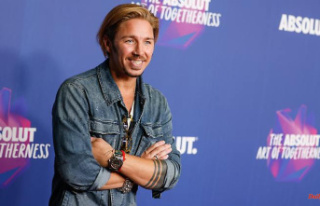No more US blockbusters, rock'n'roll and Greek gods: under the leadership of President Putin, Russia is radically turning away from Western culture and values. Artists, musicians and filmmakers loyal to the Kremlin are working on a "conservative revolution".
After years of pro-Western liberalism, a cultural turning point is taking place in Russia. Artists and other cultural figures still in Russia after the attack on Ukraine are under increasing pressure to support the Kremlin's desire to return to the country's conservative roots.
The Russian cinema star Sergey Besrukov is apparently in line with the Kremlin. He is convinced that the world has had enough of "liberal values". In his view, Russia's military operation in Ukraine and the Western sanctions against his country can help Russian culture finally go its own way again - with conservative values, patriotism and the orthodox faith.
"We have to use the isolation to reconnect with our traditions," says Bezrukov, who is one of Russia's most popular artists. Instead of looking up to Hollywood, Russia should build its own culture. He advocates purging Russian culture of Western influence.
"We've lived in the Marvel Universe for 30 years," says the 48-year-old actor and director, referring to the US film industry. "It's time to create our own," urges Bezrukov at Moscow's Gubernsky Theater, where he is artistic director. "It's impossible to go back to the times of the USSR, but we can try to restore confidence in Russia," he adds. Bezrukov was recently sanctioned by the European Union for his support for the Russian invasion of Ukraine.
In the past, Kremlin boss Vladimir Putin, himself divorced from his wife, has always presented himself as the guardian of traditional values such as marriage between man and woman and religion, and has emphasized that Western liberal values have become obsolete. Since Moscow's war in Ukraine began, the authorities have redoubled their efforts to break with Western values - and many artists say art should play the leading role in this. "Russia is on the verge of a conservative revolution," says theater producer and director Eduard Boyakov, who advocates what he calls Russia's "holy war" in Ukraine.
After the start of the war in Ukraine at the end of February, numerous artists left Russia, including the director Kyrill Serebrennikov and the actress Shulpan Khamatova. Those still in the country are under increasing pressure to support the invasion of Ukraine. Many opponents of the Kremlin can no longer perform in Russia.
"More than a hundred music performances have been canceled since February," says Alexei Kozin, director of Navigator Records, a major Russian music label specializing in rock. An unofficial "black list" currently consists of around 40 names, including Yuriy Shevchuk, a legendary rock musician who, during a concert in May, accused the Kremlin of "killing" young Russians and Ukrainians.
In late July, the leader of the pro-Kremlin Fair Russia party, Sergei Mironov, called for a "white list of patriotic artists" to explain to the public "who is who in Russian art today."
In June, the Moscow authorities announced leadership changes in three of the capital's top theaters. The Gogol Center, developed by Serebrennikov into a bastion of artistic freedom, was closed. There were also cancellations of exhibitions. "In the midst of the war in Ukraine, a cultural revolution is taking place in Russia," warns exiled editor-in-chief of Teatr magazine Marina Davidova on social media.
Olga Andreyeva from the Russian conservative weekly "Expert" also states a "revolution". "This is the moment of truth on Russia's path in the eternal struggle between Westerners and Slavophiles," she says.
Putin sets the tone: in March he called for society to "clean itself" and said that the Russians would spit out "rabble and traitors" who earned their money in Russia but preferred to live Western-style. As a symbol of this about-face, the new 100-ruble note has been decorated with the monument to the unknown soldier since the end of June. Previously, the Greek god of the arts, Apollo, was depicted there on the pediment of the Bolshoi Theatre.












